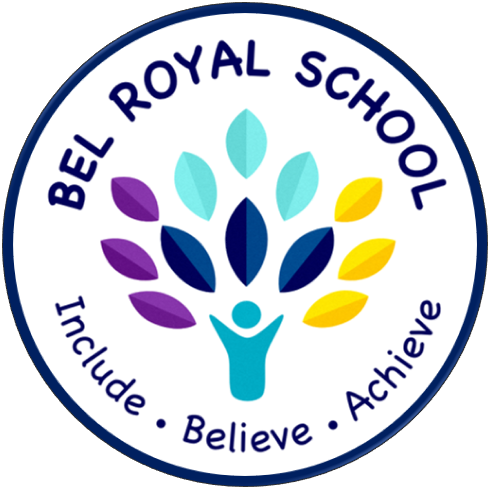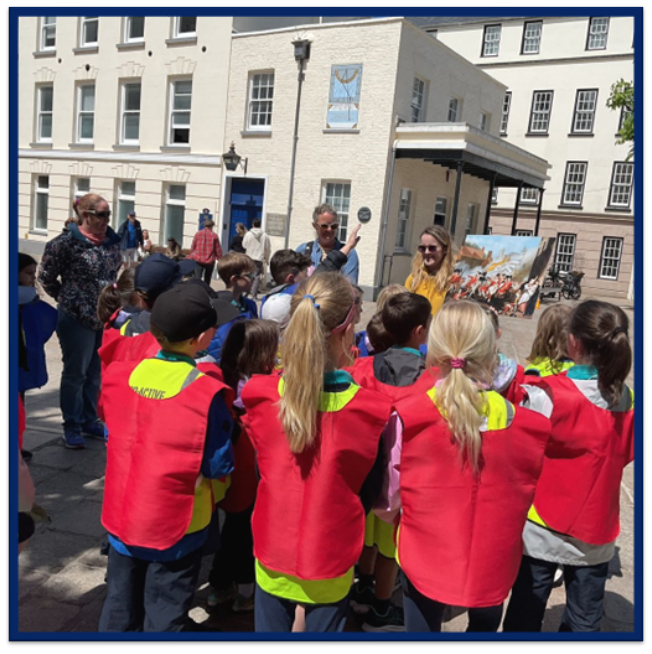
Bel Royal Primary School
History
History helps pupils to understand the complexity of people’s lives, the process of change, the diversity of societies and relationships between different groups, as well as their own Jersey identity, their human rights and the challenges of their time.
Jersey History Curriculum
Intent
At Bel Royal School we aim to deliver a high-quality history education where pupils gain a coherent knowledge and understanding of Jersey’s past, Britain and that of the wider world.
Opportunities to learn through our island’s rich and varied history are prioritised. Our island’s story is brought to life for children through strong links with Jersey Heritage and visits across the island and its historical sites. Through the teaching of history, we aim to inspire children’s curiosity about the past, which will enable them to gain a coherent knowledge and understanding of the themes and time periods studied and an enthusiasm for the value of the discipline of how to be a historian.
Our curriculum for history aims to ensure that all pupils:
-
Know and understand the history of the Island, from the earliest times to the present day: how people’s lives have shaped this nation and how Britain has influenced and been influenced by the wider world.
-
Know and understand significant aspects of the history of the wider world: the nature of ancient civilisations; the expansion and dissolution of empires; characteristic features of past non-European societies; achievements and follies of mankind.
-
Gain and deploy a historically grounded understanding of abstract terms such as ‘empire’, ‘civilisation’, ‘parliament’ and ‘peasantry’.
-
Understand historical concepts such as continuity and change, cause and consequence, similarity, difference and significance, and use them to make connections.
-
Understand the methods of historical enquiry, including how evidence is used rigorously to make historical claims, and discern how and why contrasting arguments and interpretations of the past have been constructed.
-
Gain historical perspective by placing their growing knowledge in different contexts, understanding the connections between local, regional, national and international history.
Implementation
History is taught using a cross-curricular approach, making purposeful links to other areas of learning, including the application of the use of digital technology and literacy and numeracy skills. Each topic is introduced through an engaging hook and enquiry question that guides the learning journey. For example, “Why was Jersey so special in the Stone Age?” Lessons provide opportunities for children to apply the use of digital tools and equip pupils to question, think critically, weigh evidence, sift arguments and develop perspective and judgement.
In Early Years and Key Stage 1, children develop an awareness of the past using accurate terminology and an understanding of chronology and where people and events fit in relation to each other. Children learn about historical enquiry and how we find out about the past. Pupils learn about changes within living memory and beyond by studying significant individuals and significant events or places both locally, nationally and globally. Learning is brought to life for children visiting castles, becoming pirates and much more!
In Key Stage 2, children build on their earlier learning which is recapped through the school’s Golden Threads. Throughout Years 3 – 6, history topics are taught chronologically from the earliest to latest time periods, where children learn an overview of the period studied and then gain a deeper understanding of selected aspects. Beginning with children in Year 3 learning about the pre-historical period of the Stone Age, and into Year 6 where the significance of World War 2 is studied. Chronology is developed by noting connections, contrasts and trends overtime. Children question change, cause, consequence, identify how the past has influenced how we live today. Using a range of resources, including the sophisticated use of digital tools, children's research, constructing informed responses and understanding how knowledge of the past is constructed in different ways.
In our ever-changing world, the curriculum is adapted, ensuring current local and world historical events are taught and celebrated throughout lessons in class and whole school community events. This may be a spacecraft landing, coronation and who knows!

Impact
At the end of Reception, children at the expected level of development will
-
Talk about the lives of the people around them and their roles in society
-
Know some similarities and differences between things in the past and now, drawing on their experiences and what has been read in class
-
Understand the past through settings, characters and events encountered in books read in class and storytelling.
Pupils at Key Stage 1 should be taught to:
-
Develop an awareness of the past, using common words and phrases relating to the passing of time.
-
Know where the people and events they study fit within a chronological framework and identify similarities and differences between ways of life in different periods.
-
Use a wide vocabulary of everyday historical terms. They should ask and answer questions, choosing and using parts of stories and other sources to show that they know and understand key features of events.
-
Understand some of the ways in which we find out about the past and identify different ways in which it is represented.
Pupils at Key Stage 2 should be taught to:
-
Continue to develop a chronologically secure knowledge and understanding of local Jersey, British and world history, establishing clear narratives within and across the periods they study.
-
Note connections, contrasts and trends over time and develop the appropriate use of historical terms.
-
Regularly address and sometimes devise historically valid questions about change, cause, similarity and difference, and significance.
-
Construct informed responses that involve thoughtful selection and organisation of relevant historical information.
- Understand how our knowledge of the past is constructed from a range of sources.

